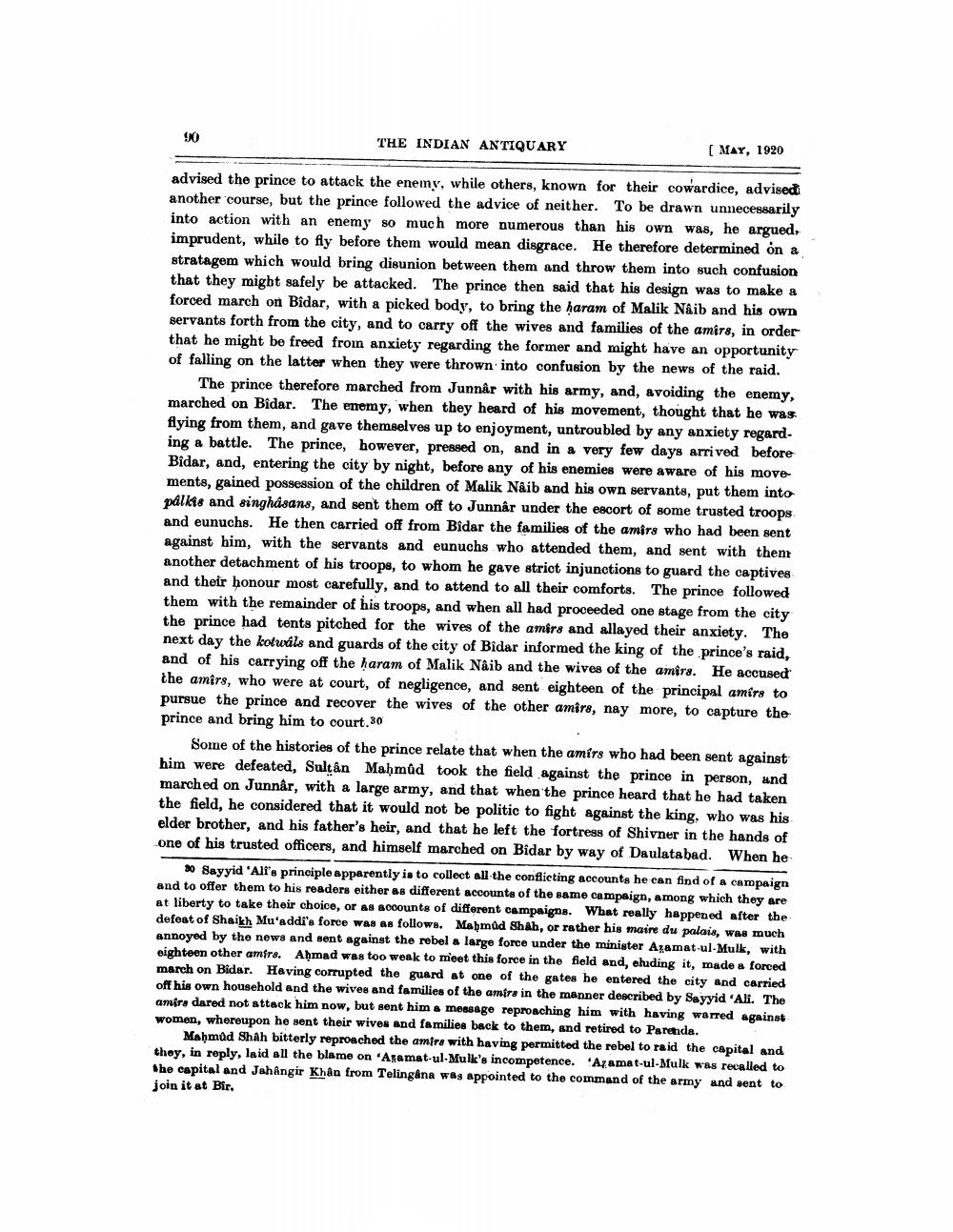________________
90
THE INDIAN ANTIQUARY
( MAY, 1920
advised the prince to attack the enemy, while others, known for their cowardice, advised another course, but the prince followed the advice of neither. To be drawn unnecessarily into action with an enemy so much more numerous than his own was, he argued, imprudent, while to fly before them would mean disgrace. He therefore determined on a stratagem which would bring disunion between them and throw them into such confusion that they might safely be attacked. The prince then said that his design was to make a forced march on Bidar, with a picked body, to bring the haram of Malik Naib and his own servants forth from the city, and to carry off the wives and families of the amirs, in order that he might be freed froin anxiety regarding the former and might have an opportunity of falling on the latter when they were thrown into confusion by the news of the raid.
The prince therefore marched from Junnar with his army, and, avoiding the enemy, marched on Bidar. The enemy, when they heard of his movement, thought that he was flying from them, and gave themselves up to enjoyment, untroubled by any anxiety regard ing a battle. The prince, however, pressed on, and in a very few days arrived before Bidar, and, entering the city by night, before any of his enemies were aware of his move ments, gained possession of the children of Malik Naib and his own servants, put them into palkis and singhäsans, and sent them off to Junnar under the escort of some trusted troops and eunuchs. He then carried off from Bidar the families of the amirs who had been sent against him, with the servants and eunuchs who attended them, and sent with them another detachment of his troops, to whom he gave strict injunctions to guard the captives and their honour most carefully, and to attend to all their comforts. The prince followed them with the remainder of his troops, and when all had proceeded one stage from the city the prince had tents pitched for the wives of the amirs and allayed their anxiety. The next day the kotwáls and guards of the city of Bidar informed the king of the prince's raid, and of his carrying off the haram of Malik Naib and the wives of the amire. He accused the amirs, who were at court, of negligence, and sent eighteen of the principal amire to pursue the prince and recover the wives of the other amirs, nay more, to capture the prince and bring him to court.30
Some of the histories of the prince relate that when the amirs who had been sent against him were defeated, Sultan Mahmud took the field against the prince in person, and marched on Junnar, with a large army, and that when the prince heard that he had taken the field, he considered that it would not be politic to fight against the king, who was his elder brother, and his father's heir, and that he left the fortress of Shivner in the hands of one of his trusted officers, and himself marched on Bidar by way of Daulatabad. When he
30 Sayyid 'Ali's principle apparently is to collect all the conflicting accounts he can find of a campaign and to offer them to his readers either as different accounts of the same campaign, among which they are at liberty to take their choice, or as accounts of different campaigns. What really happened after the defeat of Shaikh Mu'addi's force was as follows. Mahmud Shah, or rather his maire du palais, was much annoyed by the news and sent against the rebel a large force under the minister Azamat-ul-Mulk, with eighteen other amfrs. Ahmad was too weak to meet this force in the field and, eluding it, made a forced march on Bidar. Having corrupted the guard at one of the gates he entered the city and carried off his own household and the wives and families of the amira in the manner described by Sayyid Ali. The amire dared not attack him now, but sent him a message reproaching him with having warred against women, whoreupon he sent their wives and families back to them, and retired to Paretda.
Mahmud Shah bitterly reproached the amirs with having permitted the rebel to raid the capital and thoy, in reply, la id all the blame on "Anamat-ul-Mulk's incompetence. Ayamat-ul-Mulk was recalled to She capital and Jahangir Khan from Telingana was appointed to the command of the army and sent to join it at Bir.




